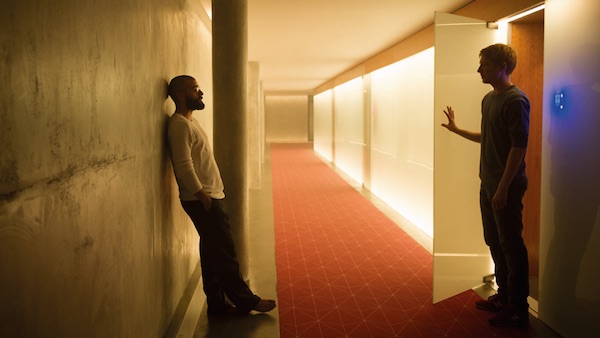Ex Machina Review
Posted on August 10, 2015 By John Gilpatrick 2015, Movie Reviews
In the last few years, we’ve seen a surge in both quantity and quality of films that question and dissect what it means to be human. Two obvious standouts are Spike Jonze’s Her and Jonathan Glazer’s Under the Skin, which see Scarlett Johansson portray a loving operating system and ravenous Scottish alien, respectively. The former has the emotional maturity of a human but no body, while the latter is there physically without any idea how to connect with another individual.
Alex Garland’s Ex Machina takes the more human halves of both of these characters and applies them to Danish actress and 2015 “it girl†Alicia Vikander. She plays Ava, an intelligent robot with some human features. She lives in the massive, hidden, futuristic compound of Nathan (Oscar Isaac), the reclusive billionaire who created her, and Kyoko (Sonoya Mizuno), Nathan’s mute servant. They’re joined for an indeterminate amount of time by Caleb (Domhnall Gleeson), an employee of Nathan’s who won a lottery to come out here and is tasked with finding out just how human Ava is. Could she be merely mimicking his and Nathan’s patterns and habits? Or is she truly intelligent? And if it’s the latter, what the hell does that mean?
It takes a long time for Ex Machina to reveal itself. Here again, it proves to have a lot in common with Under the Skin, but anyone expecting Garland’s film to pack the same dramatic and thematic punch as Jonathan Glazer’s stark masterpiece will be disappointed. This is a pure genre picture—packed with twists, turns, blood, and sex—but it’s such a delicious one that it’s hard not to admire it as a magnificent achievement in filmmaking.
It’s the rare film that has me eager to discuss its production design, cinematography, and sound first and foremost, which is far from a bad thing, but rather a sign that Garland is a filmmaker worth keeping an eye on—someone very capable of putting all the pieces together and creating something truly masterful, even if he doesn’t hit every single note perfectly here.
Anyway, the entire film takes place in Nathan’s compound, which is a truly awe-inspiring and, later, frightening place. Ex Machina has all the makings of a haunted house movie except the requisite ghosts and ghouls, but his ability to turn a dwelling into a living, breathing character is damn impressive. The combination of its state-of-the-art-ness and immaculate cleanliness—especially as they’re captured through the cautiously curious lens of Rob Hardy’s camera—simply scream out that menace is lurking around any and every corner.
One could say the same thing about the character of Ava, who’s as closed off as the film is for its first two-thirds. Or maybe that says something about Caleb and the gaping chasm that exists between his perceived intelligence and reality. Either way, the dance these two engage in is an eminently compelling one. Throw the physically and psychologically dominating Nathan and the extraordinarily mysterious Kyoko into the mix, and you’ve got one of the best small ensemble pieces in some time.
Oh, and did I say “dance?” Yeah, this happens:

Ex Machina plays a lot better the second time around than the first. Knowing how things progress, you’ll be better able to separate its polish from the fact that it’s gleeful about being a genre film. And that’s fine because its execution is nearly flawless. But don’t expect a transcendent moviegoing experience. Just a supremely satisfying one. A scary, funny, wild one. A great one.
2015, 3.5 Stars, Alex Garland, Alicia Vikander, Ben Salisbury, Domhnall Gleeson, Ex Machina, Geoff Barrow, Mark Day, Oscar Isaac, Rob Hardy, Sonoya Mizuno

















One Response to Ex Machina Review